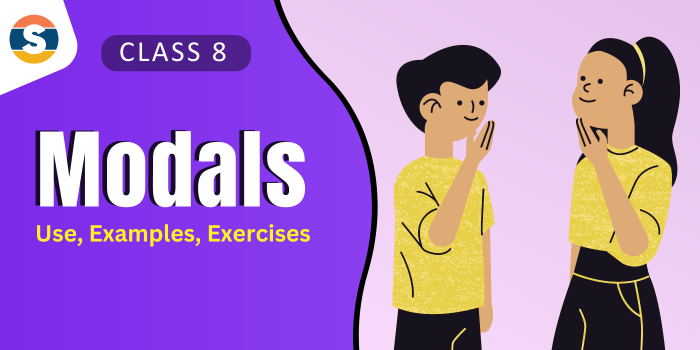
Class 8 English Grammar Modals| Uses of Models with Examples and exercise with answers for Class 8 Students
The topic of Modals for Class 8 is included in the integrated test practice questions of English grammar. Students should understand the grammatical concept of modals so that they can score good marks in English grammar. Here in this post you can see the explanation of each modal as is required for class 8 students. At the end, you can practice questions on Modals to test your knowledge.
Let us see what do we mean by Modals–
Modals are a type of helping verbs. They used with the main verb to express any of the following –
1. the ability of the subject
2. possibility of a happening
3. probability or chance of its happening
4. the necessity of an action.
5. For seeking permission
Modals are also known as modal auxiliaries.
Here is a list of commonly used modals–
- can
- could
- shall
- should
- will
- may
- might
- ought to
- would
- need to
Use of each modal with examples
Can
The modal ‘can’ is used to express ability or opportunity, to request or offer permission and to show possibility or impossibility.
Look at the examples:
- I can paint very well. (Ability)
- We can stay with my cousin when we are in the UK. (Opportunity)
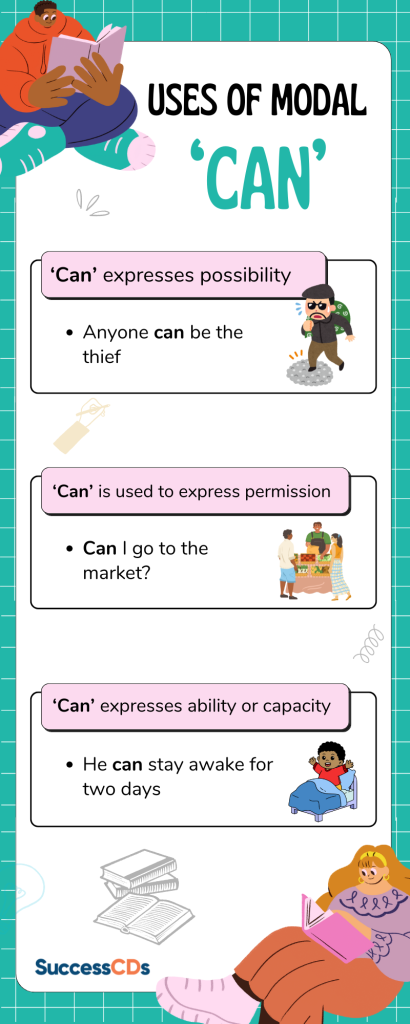
Could
‘Could’ modal is used to express possibility or past ability and also to make any suggestions and polite requests. ‘Could’ is also commonly used in conditional sentences showing the possibility in the past.
Look at the examples:
- Extreme storm could cause a delay in the matches. (Possibility)
- Had we started earlier, we could have reached in time. (Conditional)
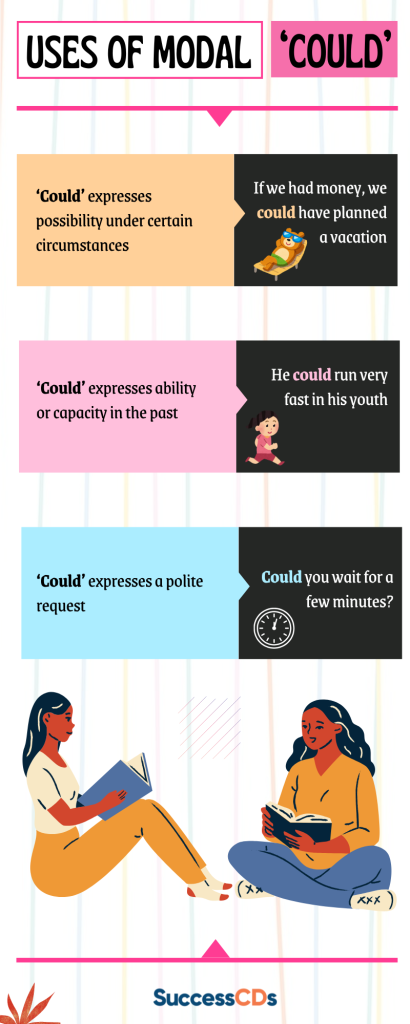
May
‘May’ modal is usually used to express a possibility. It can also be used to give or request for a permission in formal cases.
Here are a few examples:
- Cyrus may be at home or perhaps in the gym. (Possibility)
- John, you may go for a trip with your friends. (Giving permission)
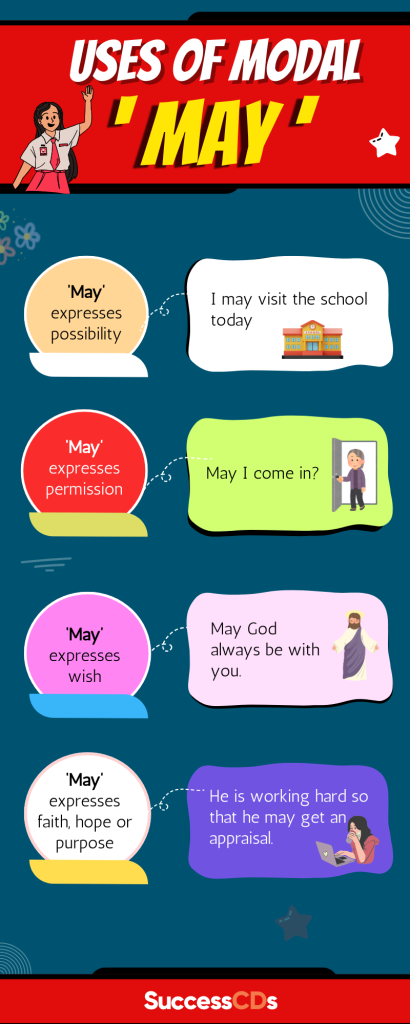
Might
‘Might’ is usually used for expressing a possibility. It is also used in conditional sentences. English speakers can also use ‘might’ to make some suggestions or requests.
Look at the examples:
- Your luggage might be at the reception. (Possibility)
- If you had texted me, I might have come. (Conditional)
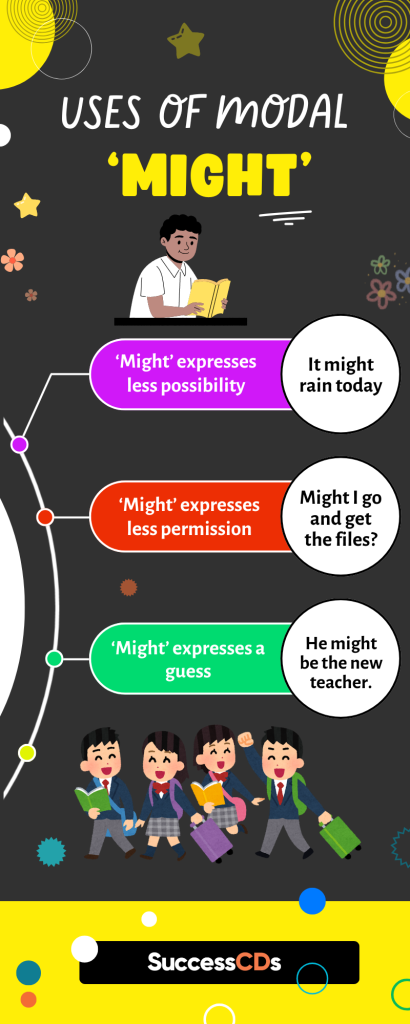
Will
‘Will’ is used with promises and determinations that take place in the future. ‘Will’ can also be used to make predictions about the future.
Look at the following examples:
- I promise that I will never repeat this mistake in future. (Promise)
- I think it will rain today. (Prediction)
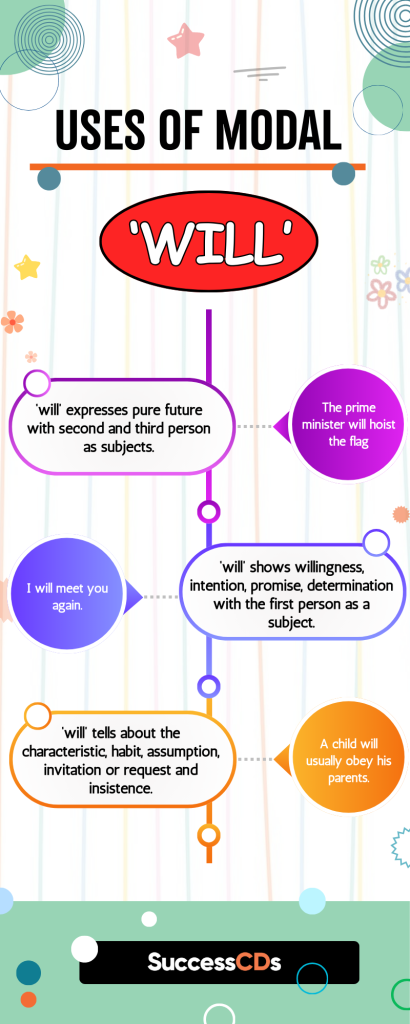
Would
‘Would’ is generally used to create conditional verb forms. It also serves as the past form of the modal verb will. ‘Would’ is also used to indicate past habits for which we also use ‘simple past tense’ or ‘used to’.
Look at the examples:
- If he were a singer, he would earn a lot of money. (Conditional shows: he is not a dancer)
- As a young boy, he would participate in school activities. (Past habit)
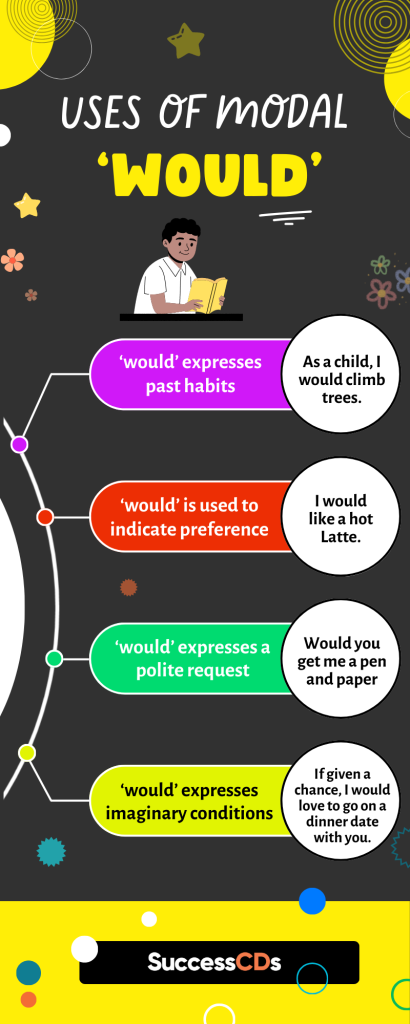
Shall
‘Shall’ is used to indicate a future action. ‘Shall’ is also used in promises or voluntary actions. It is also used to describe future events that often express inevitability or predestination.
Look at the examples:
- I shall never forget the way you helped me. (Promise)
- He shall become our next President. (Predestination)
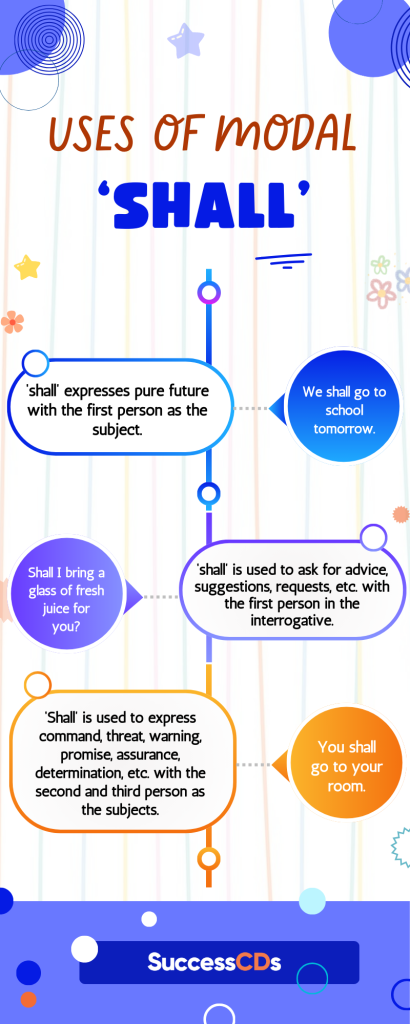
Should
‘Should’ is usually used to make a recommendation or give advice. It might also be used to express obligation as well as an expectation.
Look at the examples:
- When you visit the USA, you should go and see the Statue of liberty. (Recommendation)
- You should focus more on your studies than games. (Advice)
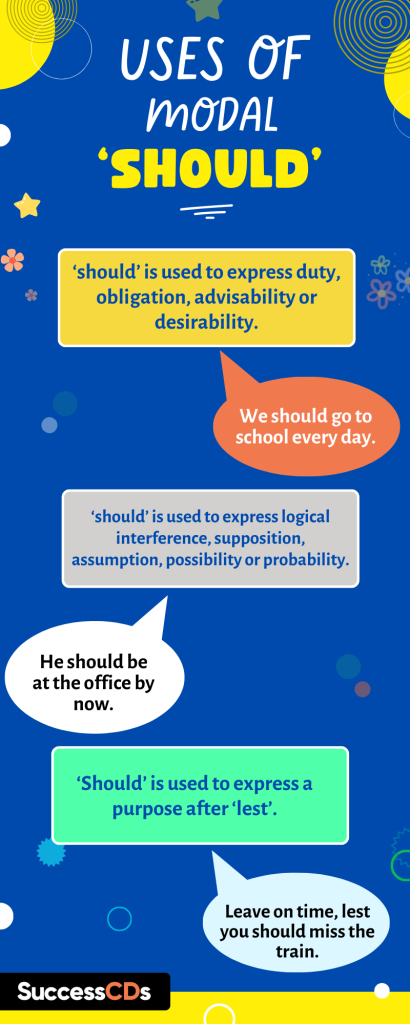
Must
‘Must’ is most commonly used to express certainty. It can also be used to express necessity or strong recommendation.
Look at the examples:
- This must be the right ingredient for her dish! (Certainty)
- Students must pass an entrance examination to study at this school. (Necessity)
Ought To
‘Ought to’ is used to advise or make recommendations. ‘Ought to’ is also used to express moral obligation. ‘Ought not’ (without ‘to’) is also used to advise against doing something.
Look at the examples:
- You ought to stop drinking. (Recommendation)
- This stock ought to increase in value. (Probability)
Had Better
‘Had better’ is usually used to make recommendations. It can also be used to express desperate hope as well as to warn people for something.
Look at the examples:
- You had better have your breakfast in the morning. (Recommendation)
- That train had better get here soon! (Desperate hope)
Modals for Class 8 Exercise with Answers
Choose the correct modal to fill in the blank, out of the given options
1. We __________ respect our elders.
a. can
b. could
c. ought to
d. may
2. __________ you hand me the stapler?
a. Can
b. Have
c. ought to
d. Might
3. I really _________ be in the office by 9:00 am.
a. can
b. could
c. might
d. should
4. You ________ take some extra food along with you.
a. will
b. must
c. would
d. None of these
5. I __________ make the arrangements for the party tonight.
a. can
b. will
c. may
d. would
6. _________ I use your mobile to call my mother?
a. can
b. could
c. may
d. all of these
7. We ___________ overcome this situation soon.
a. may
b. would
c. will
d.can
8. He _________not stay out after 11 pm.
a. can
b. may
c. would
d. might
9. You ________ wait or call again later.
a. will
b. would
c. could
d. have to
10. Max _________ not drink so much.
a. ought
b. would
c. will
d.may
11. By now, they ________ have reached London.
a. shall
b. should
c. may
d.ought
12. Any child _________ grow up to be a President.
a. can
b. would
c. should
d. have to
13. She ___________ be able to help you.
a. can
b. might
c. ought
d. have to
14. Sam _________ sing like a pro by the age of one.
a. can
b. could
c. might
d. should
15. I knew that she _________ be very successful in her career.
a. coukd
b. would
c. must
d.might
16. You __________better know your limits before talking to me!
a. should
b. have
c. must
d.might
17. Jennifer, you _________ not play outside after 7:00 pm.
a. could
b. would
c. must
D. ought
18. _________ I come in?
a. Can
b. Could
c. May
d. Might
19. You __________ visit the Taj Mahal during your visit to Agra.
a. must
b. might
c. have to
d. could
20. _________ I come along with you?
a. shall
b. would
c. will
d.must
Answers
1. We ought to respect our elders.
2. Can you hand me the stapler?
3. I really should be in the office by 9:00 am.
4. You must take some extra food along with you.
5. I will make the arrangements for the party tonight.
6. Could / can / May I use your mobile to call my mother?
7. We will overcome this situation soon.
8. He cannot stay out after 11 pm.
9. You could wait or call again later.
10. Max ought not drink so much.
11. By now, they should have reached London.
12. Any child can grow up to be a President.
13. She might be able to help you.
14. Sam could sing like a pro by the age of one.
15. I knew that she would be very successful in her career.
16. You should better know your limits before talking to me!
17. Jennifer, you must not play outside after 7:00 pm.
18. May I come in?
19. You must visit the Taj Mahal during your visit to Agra.
20. Shall I come along with you?
More Posts on the Topic MODALS
- Modals Class 10th| Modals in English Grammar
- Modals Exercises with Answers
- Modals for Class 8 use, examples, exercises
- Modals in English Grammar for Class 9
- Exercises on Modals Rules (True or False)
- Modals Quiz – Modals MCQ Exercises for Class 9, 10
Also See:
- Tenses for class 8 Students| Types of Tenses with Examples
- Determiners for Class 8 Rules, Exercises
- Class 8 Subject Verb Agreement, Examples, Exercise
- Reported Speech for Class 8 English Grammar
Modals
Tenses
English
Modals for Class 8 use, examples, exercises
https://www.successcds.net/learn-english/modals-class-8-exercises
Tenses for Class 8
https://www.successcds.net/learn-english/tenses-for-class-8-types-examples
Wow! This is very useful.
100/89 👍 it help that much